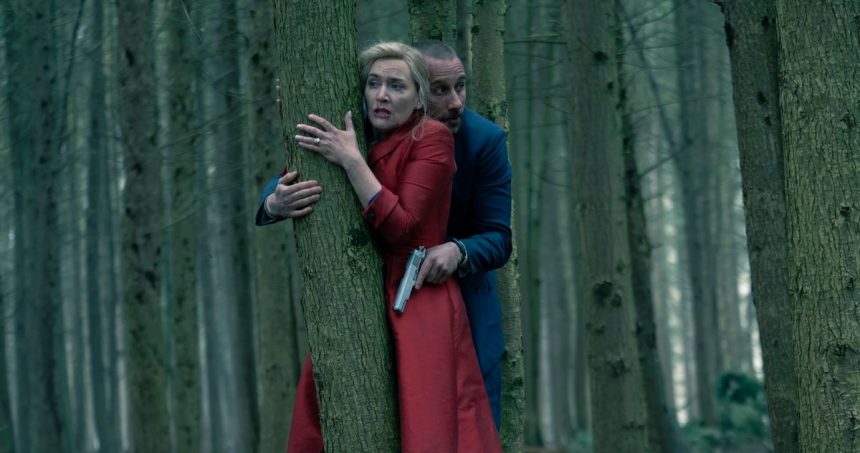Photo: Miya Mizuno/HBO
When Elena Vernham emerges from a trap door and sets foot on an arid field outside the palace at the beginning of this season finale, she might as well be an extraterrestrial, taking her first steps on some distant planet. She has no familiarity with the country she’s been governing, no sense of how the people who supposedly “love” her actually live. And so she throws a tantrum: “I can’t,” she screams to Zubak. “I can’t be in that state of being or not being like I’m just some person surviving. We’re going back to who I was.” It takes Zubak to remind her, forcefully, that she has no power anymore and that she’s in his world now, where they have to go about the humble business of staying alive by any means necessary.
Though The Regime has lost much of its satirical punch since its promising premiere episode, the finale does well to restore it, mostly by coming full circle to where we began. Elena’s entire purpose as Chancellor is to be the charismatic figurehead of an oligarchy, a clothes horse for a country that exists to enrich billionaires like Emil Bartos and turn its resources over to America, which wants access to its cobalt mines and is willing to plug its nose over reports of human rights abuses and autocratic corruption. Her relationship with Zubak disrupted the natural order of things because “his world” was supposed to be something she ignored while Bartos and her advisers splashed around in riches like Scrooge McDuck. It’s been a maddening ordeal for them to make her embrace her role.
The Regime has struggled to give Elena’s relationship with Zubak the emotional legitimacy it needs to work, which is a shame since the finale has the courage to bring it to a properly brutal ending. What creator Will Tracy, who wrote this episode, has tried to pull off is akin to the audacious romance at the center of Martin Scorsese’s Killers of the Flower Moon. That film wrestles with the contradiction of a white man (Leonardo DiCaprio) who genuinely loves the indigenous woman (Lily Gladstone) he marries, despite being part of a conspiracy to rob her of oil money. Elena’s government has happily starved its own people for money, but her passion for Zubak is not a put-on, which has thrown the regime into total disarray. She’s not supposed to be acting on her whims, and she’s certainly not supposed to be giving vast swaths of land back to the people. Love has disrupted the natural order of things.
“Don’t Yet Rejoice” serves as a forceful reminder that we haven’t really seen the country Elena governs, outside of a heavily orchestrated public relations trip to Westgate that she needed an oxygen tank to survive. She looks fittingly absurd dashing through the woods in her formal red dress and it takes constant scolding from Zubak to remind her that she doesn’t have access to cameras, planes, or her social media team, and she can’t rue her misfortune by screaming “The cunts!” at top of her lungs. As she and Zubak scurry through the surrounding area, looking for a place to stay, the show offers a full glimpse of the wreckage beyond the palace gates, which can’t all be chalked up to the civil war raging across the country. She has no idea how badly ordinary people live.
One of those ordinary people is a drunk old coot named Tomas, who offers a ride and shelter to Elena and Zubak in the midst of a 9 p.m. curfew and intensifying search to find them and bring them to justice. The naive and narcissistic Elena accepts Tomas’ loyalty at face value — “He’s a beautiful, perfect idiot,” she raves to Zubak — but he predictably betrays them, locking them away until the Westgate rebels show up. When they do, her chief interrogator turns out to be Mr. Laskin (Danny Webb), the country’s own head of security service, who may be a traitor but seems like the type of guy who just goes where the political winds blow. Laskin had to bottle up his frustrations for years along with the other ministers, but he uncorks it now: “Hear me now, you psychotic,” he screams. “I tried with you. Over and over, I tried to make your crippled brain walk straight, but no, you wouldn’t listen!”
The twist here is that Elena’s brain isn’t quite as crippled as Laskin assumes. He wants to come forward and confess her crimes on state television, which she correctly interprets as a sign that the Westgaters are not yet in control of the country. Her suspicions are confirmed more brutally when another team of soldiers takes out Laskin and his men and whisk Elena and Zubak to the airport hotel, where Bartos awaits at the top floor with clean clothes and an offer for Elena. She had humiliated Bartos in the past, but the situation has given him and his American partners the leverage to twist her arm a little. This entire nightmare can end for her if she loses Zubak, dismisses China, and gets back in league with America, which can offer the shadow support necessary to put down the rebellion and prop up her government again.
Tracy nails the ending of this ordeal, in which Zubak is bluntly sacrificed for a return to business as usual. In the future, where Elena is celebrating her ninth “Victory Day,” Nicky meekly raises the issue of an affair that nearly ended their marriage and her grip over the country. “Guess I had a little wobble,” she says, which is a beautiful understatement. It was more than a wobble. She loved him, and she killed him, all for the privilege of returning to a life of luxury so confining that she’s literally giving speeches from inside a bulletproof chamber. With Zubak now taking her father’s place in a glass coffin inside the palace, she can continue the relationship in her own delusional way, taking a quiet break from the day-to-day grind of destroying a country.
• “No food, no water, nothing. It’s just fucking poetry books everywhere.” At one of Nicky’s “poetry centers,” Zubak concisely describes the country’s entire social services program.
• Zubak dies in the end, but Elena keeps her word about not betraying him. That has to count for something.
• Shout out to Alexandre Desplat’s title theme, which is so infectiously silly that I never scrolled past the opening credits.
• Nice touch to hear only enough noise on the other end of Bartos’ conference call with his American partners to recognize the voice of Martha Plimpton’s Judith Holt on the other end. She was always ready to do business with a despot, but has to keep it to a backchannel.
• Elena’s mention of China’s “cancerous 5G technology” is a funny nod to the far-right conspiracy theories that have elbowed their way to the mainstream, thanks to unhinged politicians willing to exploit them.
• The return of Chicago’s “If You Leave Me Now” in the finale serves as a nice bookend to the premiere, where Elena used it as part of a tacky lounge act for guests at a state dinner. Now we hear Peter Cetera’s voice over Zubak’s coffin and the lyrics stand in earnest.











